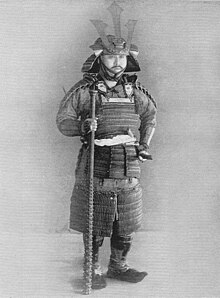Kanabō

The kanabō (金砕棒) (literally "metal stick" or "metal club") is a spiked or studded two-handed war club used in feudal Japan by samurai. Other related weapons of this type are the nyoibō, konsaibō,[1][2] tetsubō (鉄棒), and ararebō.[3] Related solid iron weapons with no spikes or studs are the kanemuchi (or kanamuchi) and the aribo (also known as a gojo or kirikobo).[4]
Description
[edit]Kanabō and other related club-like weapons were constructed out of heavy wood or made entirely from iron, with iron spikes or studs on one end. For wooden kanabō, one or both ends could be covered with iron caps. Kanabō-type weapons came in a wide variety of shapes and sizes; though the largest ones were as tall as a man, on average they measured roughly 55" in length. The Kanabō was typically intended for two-handed use, though one-handed versions exist which are more usually referred to as tetsubō and ararebō.
Their shape could be similar to that of a baseball bat, with a thicker outer end tapering towards a slender handle with a pommel, or, after the manner of a Jō, they could be straight all the way from the handle to the end. The shaft cross-section could be round (as in a baseball bat) or polygonal; that is, multi-faceted with flat surfaces arrayed around the central axis.[5][3][6]
Mythology
[edit]The kanabō was also a mythical weapon, often used in tales by oni, who reputedly possessed superhuman strength.[7][8] This is alluded to by the Japanese saying "like giving a kanabō to an oni"—meaning to give an extra advantage to someone who already has the advantage (i.e. the strong made stronger).[9]
Gallery
[edit]-
A kanabō
-
A close-up of the iron spikes of a tetsubō
-
A Japanese kanabō
-
A small antique Japanese wooden club with iron-covered ends and iron studs (ararebō)[3]
-
An old Japanese wood club with iron spikes (a kanabō or tetsubō), 4′ 9″ long and 4 lb (1.8 kg) in weight
-
A small tetsubō
-
A close-up of the iron studs on an antique Japanese ararebō, a small version of the kanabō
See also
[edit]- Bō
- Hanbō
- Jō
- Tanbō
- List of martial arts weapons
- Mace (bludgeon)
- Macuahuitl
- Morning star (weapon)
- War hammer
References
[edit]- ^ Kogan, Daniel, and Sun-Jin Kim (1996). Tuttle dictionary of the martial arts of Korea, China & Japan. p. 168.
- ^ Pauley, Daniel C. (2009). Pauley's Guide: A Dictionary of Japanese Martial Arts and Culture. p. 90.
- ^ a b c Mol, Serge (2003). Classical weaponry of Japan: special weapons and tactics of the martial arts. Kodansha International. p. 91.
- ^ Serge Mol (2003). Classical weaponry of Japan: special weapons and tactics of the martial arts. Kodansha International. p. 106.
- ^ Secrets of the samurai: a survey of the martial arts of feudal Japan. By Oscar Ratti, Adele Westbrook. p. 305
- ^ Heroes of the Grand Pacification: Kuniyoshi's Taiheiki eiyū den, p. 184
- ^ Trimnell, Edward. Tigers, Devils, and Fools: A Guide to Japanese Proverbs. p. 115.
- ^ Ishibashi, Tanzan. The Oriental Economist, Volume 43. p. 45.
- ^ The netsuke handbook. Reikichi Ueda. p. 175.
External links
[edit] Media related to Kanabo at Wikimedia Commons
Media related to Kanabo at Wikimedia Commons




![A small antique Japanese wooden club with iron-covered ends and iron studs (ararebō)[3]](http://upload.wikimedia.org/wikipedia/commons/thumb/0/01/Kanabo_tetsubo.jpg/200px-Kanabo_tetsubo.jpg)


